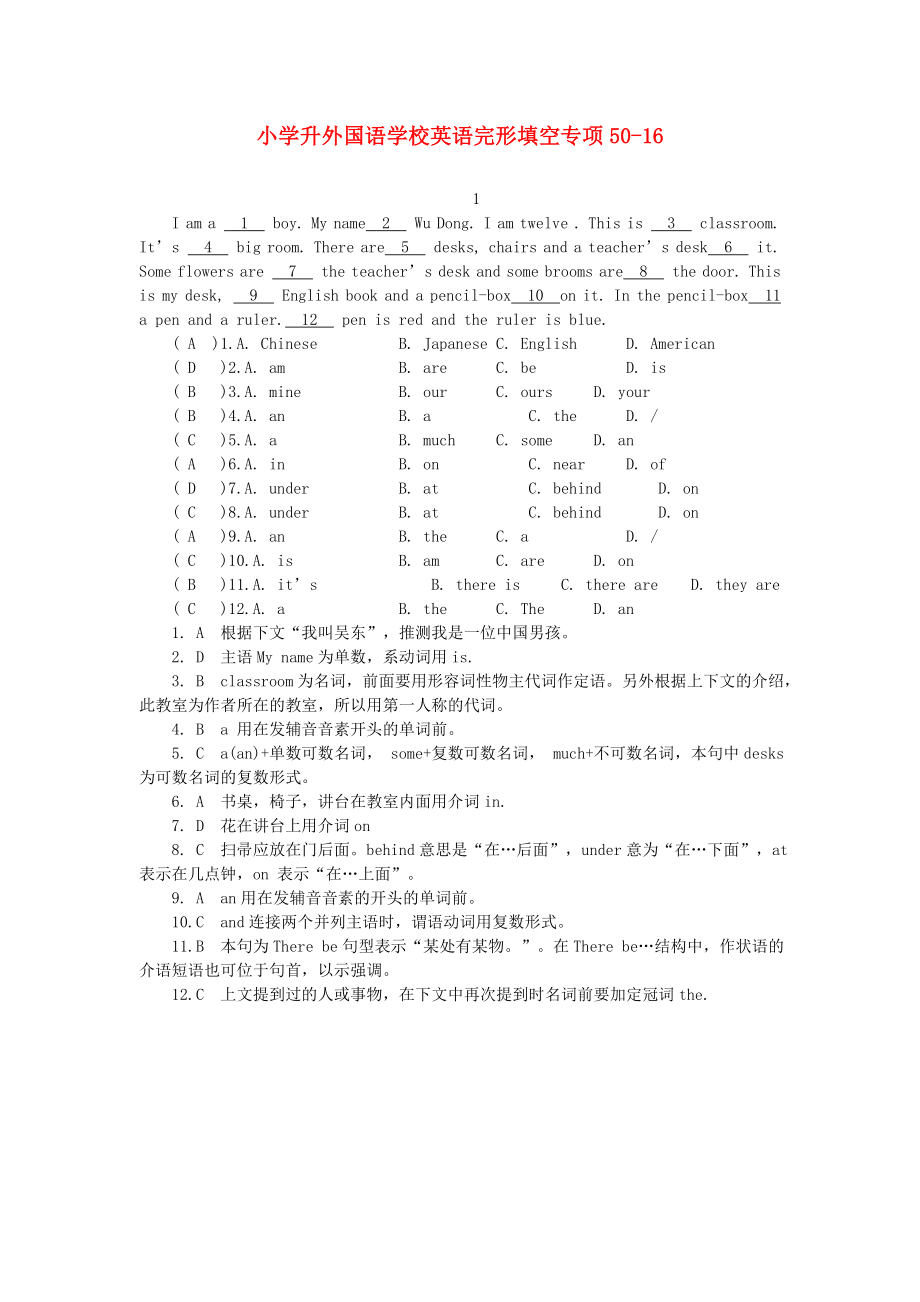《寧夏外國(guó)語(yǔ)學(xué)校小升初英語(yǔ)專項(xiàng)訓(xùn)練 完形填空16》由會(huì)員分享�,可在線閱讀,更多相關(guān)《寧夏外國(guó)語(yǔ)學(xué)校小升初英語(yǔ)專項(xiàng)訓(xùn)練 完形填空16(2頁(yè)珍藏版)》請(qǐng)?jiān)谘b配圖網(wǎng)上搜索�。
1、小學(xué)升外國(guó)語(yǔ)學(xué)校英語(yǔ)完形填空專項(xiàng)50-16
1
I am a 1 boy. My name 2 Wu Dong. I am twelve . This is 3 classroom. It’s 4 big room. There are 5 desks, chairs and a teacher’s desk 6 it. Some flowers are 7 the teacher’s desk and some brooms are 8 the door. This is my desk, 9 English book
2�、and a pencil-box 10 on it. In the pencil-box 11 a pen and a ruler. 12 pen is red and the ruler is blue.
( A )1.A. Chinese B. Japanese C. English D. American
( D )2.A. am B. are C. be D. is
( B )3.A. mine B. our C. ours D. your
( B )4.A. an B. a C. the D. /
( C
3、 )5.A. a B. much C. some D. an
( A )6.A. in B. on C. near D. of
( D )7.A. under B. at C. behind D. on
( C )8.A. under B. at C. behind D. on
( A )9.A. an B. the C. a D. /
( C )10.A. is B. am C. are D. on
( B )11.A. it’s B. there is C. there are D
4�、. they are
( C )12.A. a B. the C. The D. an
1. A 根據(jù)下文“我叫吳東”,推測(cè)我是一位中國(guó)男孩�。
2. D 主語(yǔ)My name為單數(shù)�,系動(dòng)詞用is.
3. B classroom為名詞,前面要用形容詞性物主代詞作定語(yǔ)。另外根據(jù)上下文的介紹�,此教室為作者所在的教室,所以用第一人稱的代詞�。
4. B a 用在發(fā)輔音音素開頭的單詞前。
5. C a(an)+單數(shù)可數(shù)名詞�, some+復(fù)數(shù)可數(shù)名詞, much+不可數(shù)名詞�,本句中desks為可數(shù)名詞的復(fù)數(shù)形式。
6. A 書桌�,椅子,講臺(tái)在教室內(nèi)面用介詞in.
7.
5�、 D 花在講臺(tái)上用介詞on
8. C 掃帚應(yīng)放在門后面。behind意思是“在…后面”�,under意為“在…下面”,at 表示在幾點(diǎn)鐘�,on 表示“在…上面”。
9. A an用在發(fā)輔音音素的開頭的單詞前�。
10.C and連接兩個(gè)并列主語(yǔ)時(shí),謂語(yǔ)動(dòng)詞用復(fù)數(shù)形式�。
11.B 本句為There be句型表示“某處有某物?!薄T赥here be…結(jié)構(gòu)中�,作狀語(yǔ)的介語(yǔ)短語(yǔ)也可位于句首,以示強(qiáng)調(diào)�。
12.C 上文提到過(guò)的人或事物�,在下文中再次提到時(shí)名詞前要加定冠詞the.
2
It’s four thirty. The students 1
6�、Class 4 2 in the classroom. Li Lei and Jim 3 off their coats and 4 them on the chairs. They put their bags in the desks. They think it’s 5 to go and 6 games. Li Lei says, “Excuse me, Wei Fang, can you look 7 my coat and bag ?”“ 8 ! I must go home.”
( B )1.A. at B. in
7、 C. to D. near
( A )2.A. are B. is C. am D. be
( B )3.A. put B. take C. leave D. turn
( A )4.A. put B. carry C. bring D. take
( C )5.A. when B. you C. time D. for
( B )6.A. see B. play C. do D. have
( D )7.A. at B. for C. up D. after
(
8�、 B )8.A. Excuse me B. Sorry C. Certainly D. OK
1. B 表示在哪個(gè)班級(jí)用介詞in.
2. A 句子主語(yǔ)The students為復(fù)數(shù),系動(dòng)詞要用are.
3. B 固定詞組“take off ”脫下(衣服等)�。
4. A “put ……on”意為“把……放在……上面”。 Carry意為搬運(yùn)�,leave意為“離開”,turn“翻�、轉(zhuǎn)”。
5. C 固定句型�。It’s time to do sth,意為“是該干某事的時(shí)候了”�。
6. B play games 意為“玩游戲”。
7. D 本句意思應(yīng)是“你能照看我的外套和包嗎�?”, look after表示“照顧�,照料”。
8. B 根據(jù)下文“我必須回家”說(shuō)明作者不能幫他照看�。用Sorry表示委婉的拒絕。
 寧夏外國(guó)語(yǔ)學(xué)校小升初英語(yǔ)專項(xiàng)訓(xùn)練 完形填空16
寧夏外國(guó)語(yǔ)學(xué)校小升初英語(yǔ)專項(xiàng)訓(xùn)練 完形填空16

